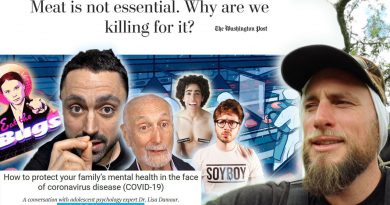Why Sugar Ages You
The last of our sugar series before we get back to more fun stuff. Here I explain exactly why sugar can age people. Yes the body can run on sugar. Yes almost everything we eat turns into some form of sugar in the body. But it’s not that simple. Those are excuses used by sugar addicts. It’s not just the FORM of sugar that matters, but also HOW much we actually need vs how much we consume and how concentrated it is. If we truly ate the way nature intended, this would not even be an issue, but almost nobody eats the way we are supposed to by design. So watch and learn and maybe it may inspire you to make a few adjustments. Nothing radical, just a few tweaks here and there. Enjoy!
Studies involving commonly consumed fruit juices showed that natural fructose carbohydrates can alter lipid and protein oxidation biomarkers in the blood, and mediate oxidative stress responses Fructose, insulin resistance, and metabolic dyslipidemia
https://www.ncbi.nlm.nih.gov/pmc/articles/PMC552336/
Although fructose does not acutely raise insulin levels , chronic exposure can lead to hyperinsulinemia and obesity through other mechanisms
https://www.ncbi.nlm.nih.gov/pmc/articles/PMC552336/
fruit sugar: Juicing removes more than just fiber
harvard test show whole fruit good, juicing fruit increased type 2 diabetes and juicing removes more than just fiber especially phytonutrients like polyphenols, flavonoids, anthocyanin, isoflavones, flavone, flavonal, which are powerful antioxidants. When the fiber reaches the gut, the gut bacteria breaks down the fiber, releasing those phytonutrients into our system. When you throw out the fiber, you are throwing away almost 80 percent of the polyphenols!
Health implications of fructose consumption: A review of recent data https://www.ncbi.nlm.nih.gov/pmc/articles/PMC2991323/
Fructose-Induced Hypertriglyceridemia: A Review https://www.sciencedirect.com/topics/biochemistry-genetics-and-molecular-biology/fructokinase
Intermittent Fasting https://youtu.be/usf4ECBHiyQ
Nothing Till 4 Intermittent Fasting https://youtu.be/ovlTL8Nc2h4
There is considerable evidence supporting the ability of high fructose diets to upregulate the lipogenesis pathway, leading to increased TG production Kok N, Roberfroid M, Delzenne N. Dietary oligofructose modifies the impact of fructose on hepatic triacylglycerol metabolism. Metabolism. 1996;45:1547–1550
https://www.ncbi.nlm.nih.gov/pubmed/8969290
In insulin resistant fructose fed rats, it has been reported that the increase of hepatic SREBP-1 mRNA occurs in correlation with an increased PTP-1B expression
Nagai Y, Nishio Y, Nakamura T, Maegawa H, Kikkawa R, Kashiwagi A. Amelioration of high fructose-induced metabolic derangements by activation of PPARalpha. Am J Physiol Endocrinol Metab. 2002;282:E1180–1190
Mechanisms of fructose induced lipoprotein overproduction
There is growing evidence that the insulin resistant state developed upon fructose feeding is also associated with stimulated hepatic VLDL secretion.
Parks EJ, Hellerstein MK. Carbohydrate-induced hypertriacylglycerolemia: historical perspective and review of biological mechanisms. Am J Clin Nutr. 2000;71:412–433
Japanese Dr Yoshinori Nagumo 1 meal a day doctor’s book “Hunger makes people healthy”
Glycation: Sugar molecules attach to a lipid or protein- particularly collagen and elastin proteins in the skin. This process produces advanced glycosylation end-products (AGEs) which cause protein fibers to become stiff and malformed , resulting in wrinkles, stiffness and loss of elasticity and accelerated aging, The body does not recognize AGEs as normal, and will produce antibodies that cause inflammation in the skin. Sugar is a dehydrating agent, so it increases oil production. It also affects water binding so your skin – also dark circles. Typical sugars involved in glycation are glucose, fructose, or their derivatives. Glycation is a biomarker for diabetes and is implicated in some diseases and in aging.
Insulin will not allow you to tap body fat for energy. The reason people get ravenously hungry if they don’t eat every hour or two is because they have too much insulin circulating around their body left over from the carbs they recently ate. This is why if you’re following the SAD diet, you’re going to get stuck in this loop of wanting to eat every time your blood glucose drops and 3 meals a day will feel very necessary. When you eat lost of carbs, Insulin is used to help glucose get into cells for energy, but not all the glucose can be used all at once because the cells can only use so much at once, so the body stores the left over glucose in fat cells. But this glucose in fat cannot be used if insulin is present.
During intermittent fasting, insulin is no longer present, so the energy stored in fat can finally be used





